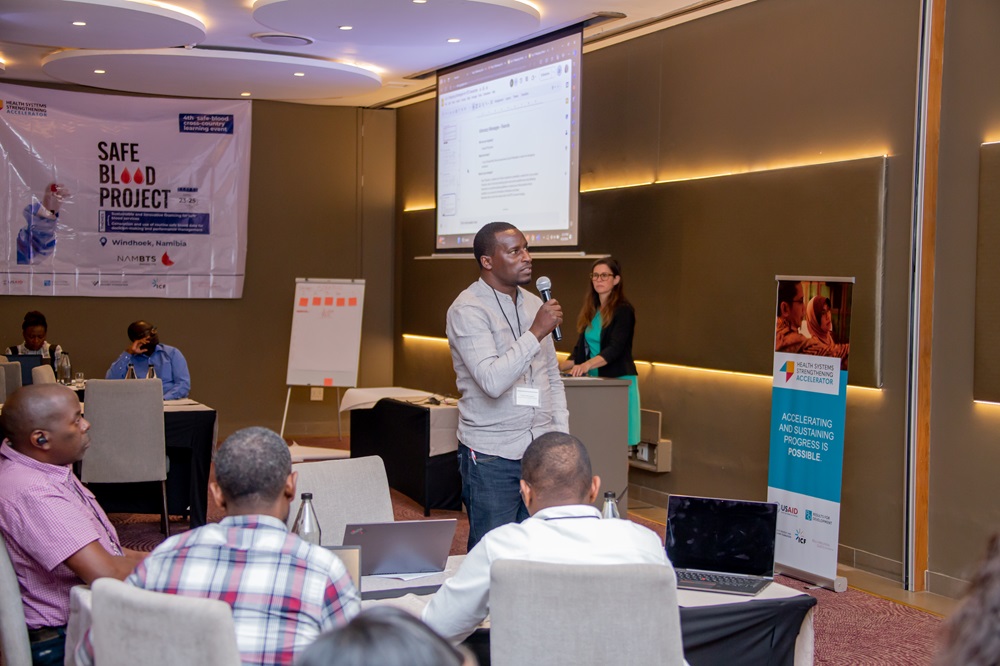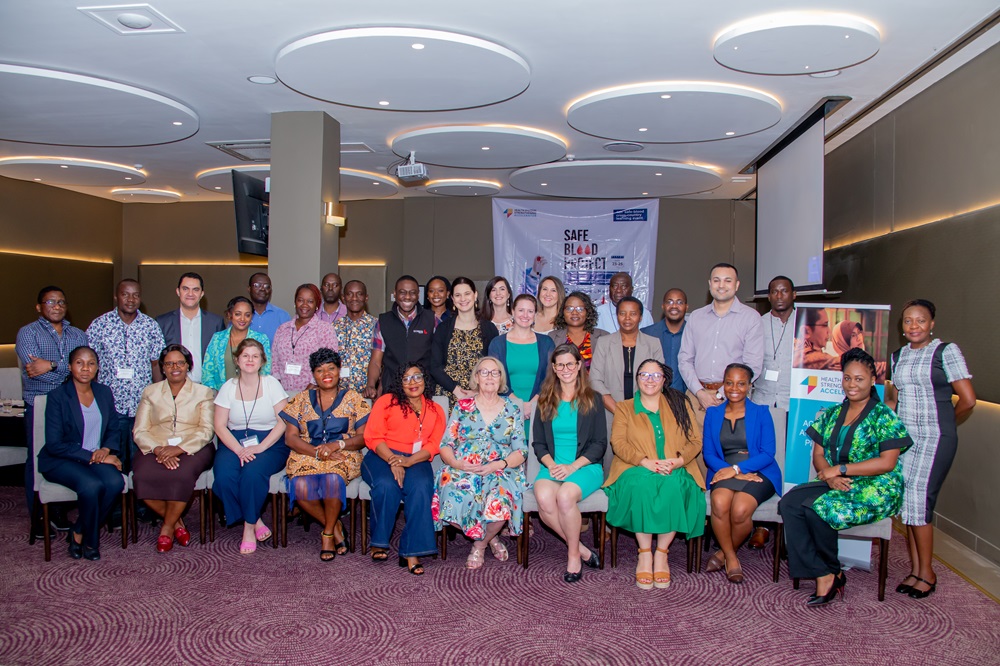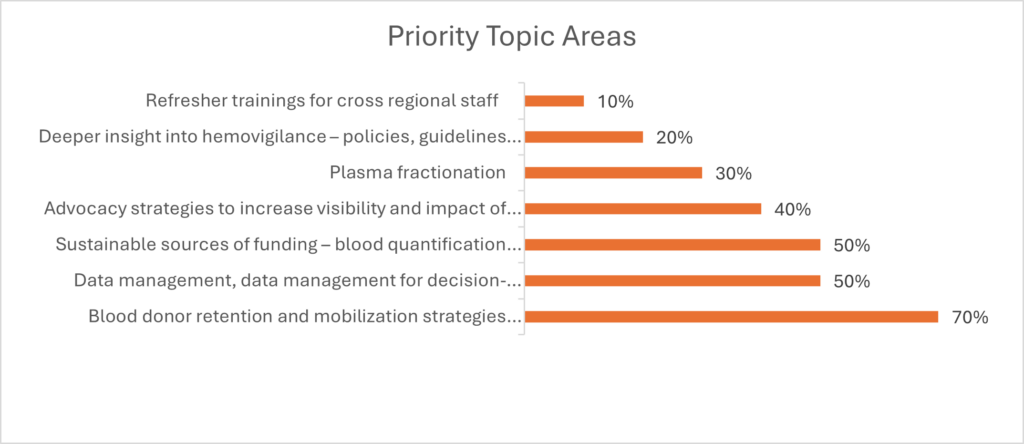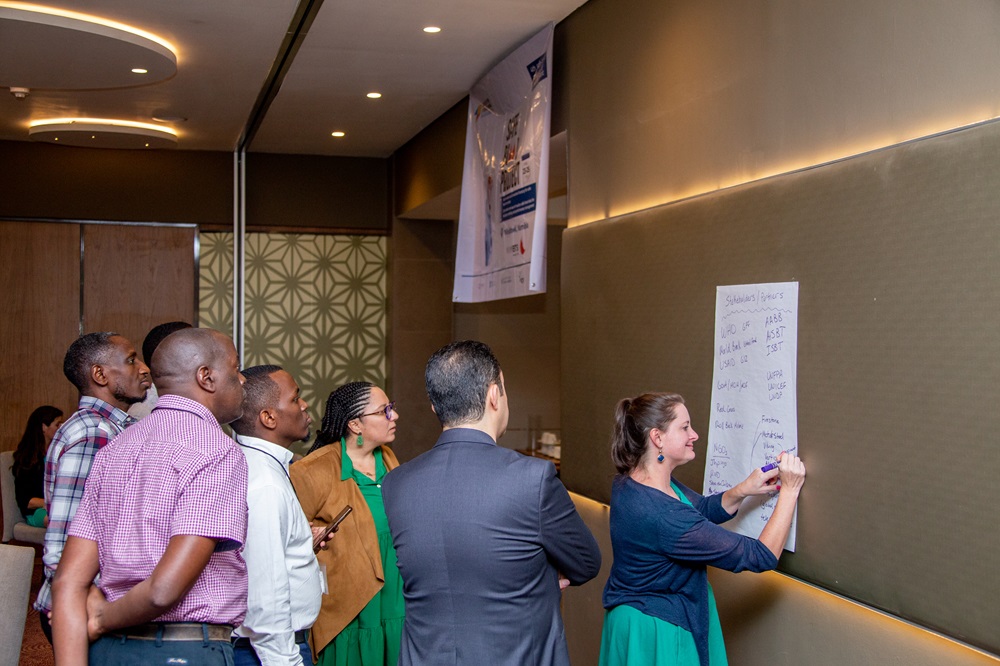Adaora Osi-Ogbu and Julie Wieland
Health Strategy and Delivery Foundation (HSDF)
As countries work to improve access to and availability of safe blood, many are undertaking health system transformations to prioritize and strengthen these systems.
Over the last year, the Accelerator’s cross-country learning initiative to support the strengthening of the safe blood systems brought together stakeholders from Liberia, Malawi, and Rwanda to exchange knowledge, proffer solutions, identify best practices, and share insights on the challenges of safe blood availability and prioritized blood systems reforms in a bid to improve timely access and availability of safe blood for their populations. While the three countries are at varying stages of development and maturity in their blood systems, there was a strong demand to learn from one another. Responding to this demand, a learning agenda was co-created, after which the Accelerator facilitated webinars and an in-person learning session with the Namibia Blood Transfusion Service (NamBTS) in Windhoek, Namibia. This initiative aimed to foster action-oriented learning focused on best practices for blood donor mobilization, hemovigilance, measuring, and strengthening safe blood systems.
The Accelerator undertook several activities that led to the capstone event and the integration of learnings, including:
Conducting key informant interviews with blood system stakeholders to understand country specific challenges and opportunities for learning and action.
Leveraging the International Maternal Newborn Health Conference (2023) to conduct a co-creation workshop with country BTS Directors. Five topics were prioritized for learning: (1) Blood donor retention and mobilization (2) Hemovigilance (3) Hemovigilance and Hospital Transfusion Committees (4) Sustainable and innovative financing for safe blood services, and (5) Generation and use of routine safe blood data for decision-making and performance management.
Hosting four virtual webinars with experts from Malawi, Rwanda, Zimbabwe, Coalition of Blood for Africa, and Nigeria. These webinars fostered dialogue around solutions, developed frameworks for hospital transfusion committees, and facilitated knowledge exchange.
Organizing one in-person event (April 2024) with the Namibia Blood Transfusion Service in Windhoek, Namibia, to explore cost-effective solutions, generate data, and improve performance.


The cross-country learning facilitated by the Accelerator consortium partner, Health Strategy and Delivery Foundation (HSDF), provided an opportunity to enhance country implementation activities, linking the cross-country learning with direct technical assistance provided by Results for Development (R4D). After the in-person learning event, HSDF conducted key informant learning checks that directly contributed to the final capstone webinar, “Reflections and the Ways Forward: Sustainability of Cross-Country Learning for Safe Blood Systems,” held on June 11, 2024.
The capstone event highlighted the value of the Accelerator-supported cross-country learning events, as recognized by country blood transfusion service (BTS) stakeholders. They appreciated the structured and demand-driven approach and expressed interest in engaging in more cross-country learning on strengthening safe blood systems. During the capstone session, participants reflected on the benefits of the safe blood cross-country learning with key takeaways and integration of learnings within BTS processes:
- Participants appreciated the organized and structured nature of the cross-country learning. Before the Accelerator-supported cross-country learning, most learning occurred at conferences or one-off events.
- Country teams have integrated the lessons from Malawi on incorporating secondary school populations as blood donors, consistent and frequent communication strategies from Namibia, and retention strategies from Zimbabwe.
- Several participants noted the importance of BTS visibility through branding and marketing, as demonstrated by Namibia, and how this can be used for advocacy with blood donors and the government.
- All participants highlighted the importance of generating good, timely, and complete data at each step of the blood transfusion continuum for effective and efficient budgeting, setting blood donor targets, improving the hemovigilance strategy and system, and advocating for strengthening blood services.
- Liberia noted that they have maintained a relationship with the Namibia BTS to discuss further lessons learned and potential adaptation management strategies. They have also incorporated a blood donor satisfaction survey into their routine collections.
- Malawi is creating an offline data collection and management system, developing school ambassador programs for blood donor retention, and exploring cost-effective solutions to meet high demands and funding needs.
- Rwanda is adopting the marketing strategies learned from Namibia BTS, incorporating blood management system updates and increasing the number of published research articles to enhance the visibility of their blood system and its impact on health.
The capstone session offered opportunities for BTS stakeholders to discuss ways to promote the sustainability of cross-country learning. Country participants identified ways to sustain and further cross-country learning, including ‘twinning,’ which aims to establish a ‘win-win’ relationship between BTSs to exchange knowledge and best practices and to publish research articles jointly. While participants noted that the virtual platform was effective for learning, it posed challenges for networking. However, Rwanda Blood Transfusion Division (BTD) offered to host country participants to tour their facilities and lab to gain insights into BTD methodologies and innovations. Finally, participants were asked to rank priority topics for future learning during the event. Most participants emphasized the importance of funding and government buy-in, data management for decision-making, and blood donor mobilization as priority topics for learning within their blood systems.

Participant feedback and results suggest that the cross-country learning provided an important and valued forum for sharing experiences and learning about country blood systems. The experience also highlighted the need for deeper and more sustained systematic learning initiatives for countries to continue to strengthen their blood transfusion services, thereby improving the overall health system to meet the needs of their populations better.

The Accelerator undertook several activities that led to the capstone event and the integration of learnings, including:
- Conducting key informant interviews with blood system stakeholders to understand country specific challenges and opportunities for learning and action.
- Leveraging the International Maternal Newborn Health Conference (2023) to conduct a co-creation workshop with country BTS Directors. Five topics were prioritized for learning: (1) Blood donor retention and mobilization (2) Hemovigilance (3) Hemovigilance and Hospital Transfusion Committees (4) Sustainable and innovative financing for safe blood services, and (5) Generation and use of routine safe blood data for decision-making and performance management.
- Hosting four virtual webinars with experts from Malawi, Rwanda, Zimbabwe, Coalition of Blood for Africa, and Nigeria. These webinars fostered dialogue around solutions, developed frameworks for hospital transfusion committees, and facilitated knowledge exchange.
- Organizing one in-person event (April 2024) with the Namibia Blood Transfusion Service in Windhoek, Namibia, to explore cost-effective solutions, generate data, and improve performance.




